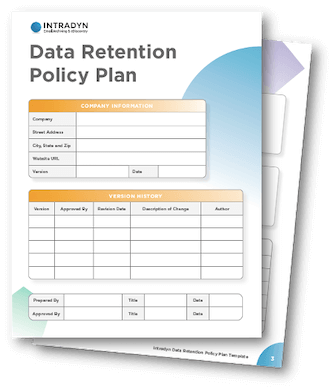Ensuring Compliance Through Student Records Management

Whether you’re an administrator at a preschool or a postsecondary institution, you’re likely all too familiar with the amount of physical and digital paperwork that can pile up — especially when it comes to student records. The good news is that student records management policies, protocols and platforms can help your school stay both organized and compliant.
What Are Student Records?
Student records — more formally known as “education records,” in compliance parlance — refer to any form of record directly related to a student and maintained by an educational agency or institution or a party acting on behalf of an educational agency or institution. As you’ll soon see, student records encompass a wide variety of physical and electronic paperwork, ranging from academic and disciplinary records to medical and financial records.
Common Types of Student Records
Some of the most common types of student records (or education records) include:
|
|
It’s a pretty extensive list — and, when multiplied across hundreds, if not thousands of students, results in a mountain of information to manage and maintain. Investing in a student records management system and defining student records retention policies not only make it easier for educational institutions to stay on top of everything, they also make it easier to safeguard sensitive student information for compliance purposes.
What Is FERPA?
The Family Educational Rights and Privacy Act (FERPA), which was signed into law in 1974, created uniform standards around data security and privacy for educational agencies and institutions funded by the U.S. Department of Education.
Designed to protect student privacy, FERPA grants the parents and/or legal guardians of eligible students the right to request, inspect and review their child’s education records maintained by the school. It also stipulates that academic institutions are not allowed to provide copies of an eligible student’s records without the express permission of that student’s parent or legal guardian (or, if the student is of age, the student themself). FERPA applies to both paper-based and electronic student records.
Although FERPA does not include specific requirements about how long schools must retain student records, it does stipulate that education records may not be destroyed if there are any outstanding requests to inspect or review the file. To that end, it’s important that academic institutions define student records retention policies that allow for indefinite record storage.
And although FERPA does not require schools to adopt specific security controls, it does require schools to make every effort to prevent student records from falling into the wrong hands. To achieve that goal, academic institutions should define security controls and policies as part of their student records management strategy and invest in software solutions with built-in security capabilities, such as end-to-end encryption and multi-factor authentication.
For more information about FERPA — including examples of FERPA violations, tips for staying compliant and a free FERPA checklist — we encourage you to read our in-depth blog post on the subject.
Why Does Student Records Management Matter?
In addition to helping educational institutions and agencies maintain FERPA compliance, developing a strong student records management strategy — which should include student records retention policy — enables schools to:
- Be more organized. A student records management strategy should include specific instructions about how to name documents, where to file them, how to retain them and so on. By having clearly defined policies and protocols, administrators can eliminate potential confusion and make it easier for staff to track down specific information at a later date.
Investing in a software platform, such as an archiving solution, can streamline student records management even further by automating components of the data capture and storage process for electronic information and for digitized copies of physical paperwork.
- Optimize administration. A student records management strategy can help ensure that all departments within an educational institution or agency adhere to the same established protocols for document storage, sharing security and more. This not only makes it easier for administrators to maintain records, but also to consistently enforce school policies. And by using an archiving solution to automate components of the data capture and storage process, administrators eliminate the need for manual data entry, thereby enhancing productivity and data accuracy.
- Gain visibility into student performance and development. With all student records and other pertinent information stored within a single, easily accessible (but still secure) place, educators can more closely monitor student activities and performance. This holistic view enables them to proactively identify students who may be in need of additional support and help them live up to their fullest potential.
- Make more informed decisions. Just as having a holistic view of student records enables educators to better understand their students’ needs, that holistic view also enables administrators to better understand their schools’ needs. Armed with this information, administrators can make more informed decisions around curriculum standards, accreditation, hiring, scheduling, budgeting, funding, compliance and much more.
How Long Do Schools Need to Keep Student Records?
There is no one correct answer to this question — how long academic institutions retain student records depend on a variety of factors, including regulatory requirements, state laws and each school’s individual needs. For example, although FERPA has no specific records retention requirements, the general rule of thumb is to retain temporary student records (such as attendance records) for a period of five years and permanent student records for at least 60 years.
Record retention requirements for public schools, colleges and universities often vary from one state to another. In fact, some states even set different record retention periods for different types of student records. For example, according to the Maine Department of Education, schools are expected to retain student health records (including records of student medications, illnesses, injuries and vaccinations) until students reach the age of 26, but personally identifiable information, student attendance records, grades and transcripts are to be retained permanently.
Although regulatory requirements and state laws should be top priority, educational institutions and agencies will also want to take their own needs into account when defining student records retention periods and policies.
How to Create a Strong Student Records Retention Policy
A strong student records retention policy is integral to any successful student records management strategy. With that in mind, your school’s policy should define (at minimum):
- What records needs to be retained
- The format(s) in which they should be kept
- How long they should be stored for
- Whether they should eventually be archived or deleted
- Who has the authority to dispose of them, and
- What procedures to follow in the event of a policy violation
Before putting together a student records retention policy, schools should be mindful to research regulatory and legislative requirements to make sure that their bases are completely covered. Depending on these requirements, an academic institution may need to define multiple policies for different types of records.
No student records retention policy is complete without an underlying system to support. An archiving solution can help you automate components of the records retention process, securely store student information and easily track down specific documents or files in a matter of seconds. Last but certainly not least, it’s important that educational institutions and agencies consistently backup their data to reduce the risk of data loss, which could impede administrative operations and increase their risk of violating FERPA, FOIA and state sunshine laws.
If you need help defining student records retention policies for your school, we recommend downloading our free retention policy template, which can be easily customized according to your needs.

